mothers2mothers at AIDS Conference 2018
This week, the international HIV/AIDS community came together in Amsterdam, the Netherlands, for the 22nd International AIDS Conference. Team mothers2mothers (m2m) joined over 15,000 scientists, activists, health providers, policy makers and global leaders to galvanise and focus our actions to ensure we meet the goal of ending AIDS by 2030.
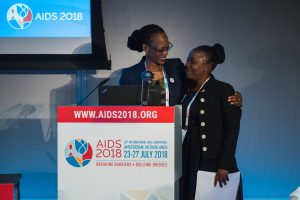
m2m’s Malawi Country Director Chileshe Chilangwa and Mentor Mother Irene Nkosi from South Africa.
We were fortunate to have colleagues from South Africa and Malawi join us for the occasion: Mentor Mother and Spokeswoman Irene Nkosi (who was named last year by US magazine People as one of the 25 People Changing the World), m2m’s Country Director for Malawi, Chileshe Chilangwa and Kathrin Schmitz, Director of Programmes & Technical Support, among others.
To kick off the week, m2m held a panel discussion on Monday 23rd July, in partnership with long-time supporter Johnson & Johnson and moderated by Deborah von Zinkernagel, Director, Community Support, Social Justice and Inclusion at UNAIDS, on ‘Is Retention in Care the Key to Delivering the Final “10”?‘. The session convened leading thinkers and frontline activists from UNICEF, the Elizabeth Glaser Pediatric AIDS Foundation (EGPAF) and Médecins Sans Frontières to discuss community-based strategies to deliver viral suppression—the last and most difficult of UNAIDS’ three 90s.
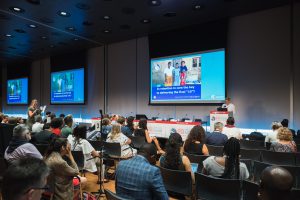
m2m’s session on retention in care at AIDS Conference 2018.
Chileshe Chilangwa kicked off the conversation by introducing m2m’s work and latest impact data, sharing that together with its partners, m2m enrolled 2.3M new clients across seven countries in 2017 – an 18% rise on 2016. She also provided an overview of m2m’s Malawi programmes, explaining that meaningful community engagement underpinned our success in the country – retention in care among our clients was at 98% at the 12 month mark in 2017, against a national benchmark of 75%!
Irene Nkosi subsequently took to the stage to describe how Mentor Mothers spend time with clients in health clinics and in the community to ensure that they enter and stay in care. Irene explained that: “Some women are afraid to disclose their status because of the stigma that still surrounds HIV. When a woman does not come back to care, she will run out of medication and will have higher chances of infecting her baby with HIV. It is up to me and my fellow Mentor Mothers to convince the woman why it is so important for them to stay in care. We do this by sharing our personal stories with them to build trust.”
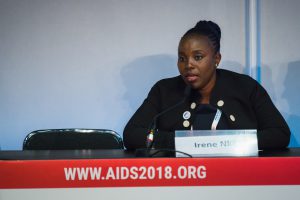
Mentor Mother Irene Nkosi sharing her powerful story.
To a round of applause from the audience, Irene shared her own story and concluded: “After the terrible first half of my life, the second half has been a different story. I went back to finish my high schooling, I run a nail salon and I passed my drivers’ licence. My little girls have a mother who they can be proud of. I was once a victim but now, I am not only surviving, I am thriving.”
Our fantastic panel spurred on the conversation and offered insights into various strategies and initiatives implemented at the community-level to keep patients in care.
Dr Esther C. Casas, senior HIV/TB Advisor at Médecins Sans Frontières, introduced “Postnatal Clubs“, which are being piloted in partnership with m2m and the City of Cape Town in Khayelitsha, the largest township in the Cape Town area. These group sessions provide integrated HIV, SRH, post-natal follow-up and EPI services for both moms and babies in one shared area. They have already shown excellent initial results aiming to retain HIV-positive mothers and their infants in care through peer support sessions and integrated clinical care.
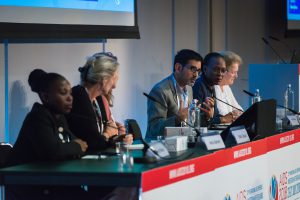
Our wonderful panel discussing the importance of keeping patients in care.
The conversation was rounded up by Dr. Anja Giphart, Executive Vice President, Medical and Scientific Affair at EGPAF, who reminded us that “for too long we’ve been trying to move everyone into the same model of facility-based services and it simply doesn’t work. No one size fits all – we need more differentiated service delivery models for specific client groups, such as adolescent-focused services, community-based treatment or home-based testing.”
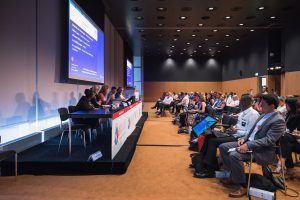
A packed room for m2m’s session at AIDS Conference!
Following a Q&A session with excellent questions from the audience, Irene brought the session to an end with this important statement: “Knowledge is power. Give a women knowledge and she becomes a rock, and she will inspire other women.” And we sure agree with that!
A huge thank you to everyone who attended and participated in our session, and a special mention to our wonderful partners at Johnson & Johnson without whom none of this would have been possible.






















